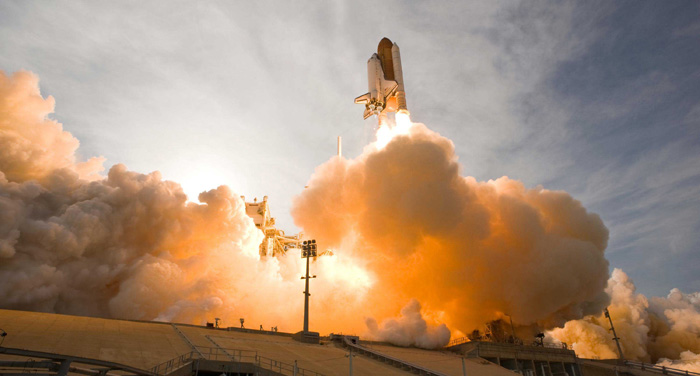Weather permitting, this final flight of the Space Shuttle program will happen around lunchtime tomorrow. I’ll be watching the webcast for sure. To my everlasting regret, I won’t be there to see Atlantis blast off in person, and only because I didn’t really plan ahead and didn’t make the commitment to simply go down there and see it. I’m really sad about that today. This will never happen again. A profound chapter in manned space flight is coming to an end.
The shuttle program started in 1981, the year I was born, and I can’t help but feel a deep connection with the now iconic spacecraft. We both turned 30 this year. I remember seeing the Challenger explode. That disaster is my earliest memory of a big news event. When I was a little kid — probably four or five — my favorite toy was a Space Shuttle Transformer. I lost that toy somewhere in our old house and can still remember how sad I felt when we moved and I still hadn’t found it. But beyond childhood memory, as an adult I’ve come to more fully appreciate not just the sheer nerd-factor awesomeness of the Shuttle as a vehicle, but the immense, epic nature of what we had to accomplish to get to where we are in terms of space technology and capability. The problems solved, the technology invented, the risks taken, the lives lost — all in the name of “slipping these surly bonds of earth to touch the face of God”, as Reagan put it.
Frankly, it bugs the hell out of me that we’ve stopped this program without a real replacement (a decision made by the Bush administration, not President Obama, who has actually expanded critical NASA funding). It further bothers me that for no other reason than partisan politics and an ignorant, apathetic public, NASA is being forced into an ever steepening trajectory of privatization. If anything ever fully kills our exploration of the universe, it’ll be a quarterly stock report. We’ll never set foot on Mars or develop the technologies that for all we know will someday save our entire species from extinction if every day’s decisions have to please stockholders’ share price expectations. Even though as is, the space program has indirectly created entire multi-billion dollar industries out of the technology pioneered to get people and equipment into the black void of space and home again safely. Like so much that ails our nation right now, it’s unfortunate, short-term thinking.
Partisan nonsense and short-term speculation aside, the Space Shuttle program — and by extension the entire manned space program — represents many of mankind’s greatest achievements. I really do believe that it represents the best of America and the best of humanity. It’s our insatiable hunger for exploration. It’s our uncanny ability to collaborate and solve problems. It’s our tenacious belief that “impossible” is only a matter of dates. It’s our careful concern for one another and our acknowledgement of the fragility of life. It isn’t enough just to fire people off the planet. We have to bring them home again. We have to take immense risks in the face of incredible danger to spend time in an environment of almost unfathomable hazard. Most of all, the space program is our most ambitious, long-term thinking. We live in a world where people are often looking no further than their next meal or their next episode of television (delivered by satellites in space, ironically). Or at most, thinking no further than this quarter’s balance sheet. That we as a country and a species dedicate a small slice of our time and resources to what really is the future gives me a lot of hope. We need to keep doing that. It’s important that we have a future.
In most science fiction lore, but Star Trek and Doctor Who especially, space exploration is what helps us get our shit together as a species. It’s the catalyst of not only our survival, but our thriving success across the universe. I believe in that potential. I believe that it’s only by looking beyond our greedy present and our little blue ball that we can actually save ourselves and our home planet. Not just through technology, but through collaboration, through unification of purpose, through acknowledgement of the precious, fragile nature of life — all the things we’ve learned while blasting men and women into orbit. In this, space exploration truly is the tide that raises all boats, and it raises them to the heavens.
So Godspeed, Atlantis. Come home to us safely and may we live up to the legacy you, your brothers in flight, and the heroic crews who flew you, have left us.
![]()

Well said.
You did forget to mention that without the space program we wouldn’t have tang or velcro. 2 of the greatest achievements ever.
I remembered very well the Challenger crash. Appropriately, I was a senior in High School and it happened during my computer class. It was a huge deal since Christa McAuliffe was on board. And she was a teacher. It was a day much like September 11th (and the Kennedy assassination from what others said.
Tomorrow will be an weird day too. It will be sad to watch the Shuttle launch for the last time.
Yes, the specific technological advances are too many to name. Not least among them, the computer as we know it. Payload weight restrictions drove the development of the first microprocessors. Now here I am typing that into a wireless keyboard that, itself, likely has more processing power than what landed on the moon.